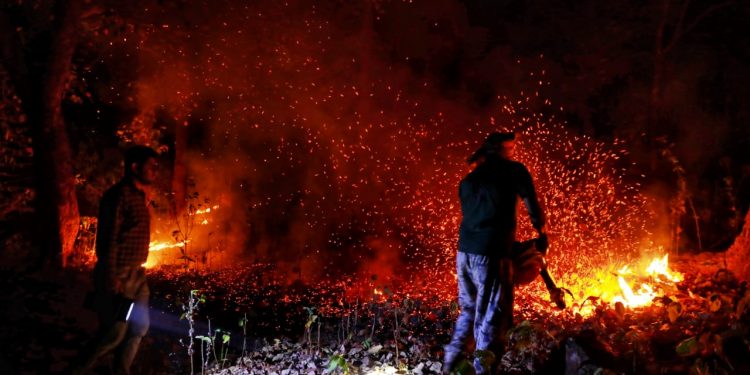The Intergovernmental Panel on Climate Change (IPCC) report released August 9 sounds the gravest warning bell ever against the disaster that is waiting in store for the whole world in the coming few decades. The fight against global warming and consequential changes on planet earth is no longer an idle academic exercise or something that may take place in remote future. It’s a stark reality dissected by scientists across the world. The biggest emitters of greenhouse gases must make sure that they have clear plans to cut their carbon output drastically. For, there is now only a small chance of escaping the worst ravages of climate breakdown. The recent unprecedented heat waves experienced in Europe, the USA and elsewhere in the northern hemisphere and torrential rains, more frequent and fiercer storms and cloudbursts in different parts of India and other countries are tell-tale evidence of the impact of the damage done to the climate by human actions. The main targeted countries which have to tighten the belt are the US, most countries of western Europe, China, India and Brazil.
Over 750 scientists have contributed to the Working Group-I report of the IPCC. They studied over 14,000 scientific publications before coming to
their conclusions.
The assessment reports are the most widely accepted scientific opinion about climate change. They form the basis for government policies to address problems arising out of climate change.
Among the scariest findings of the Sixth Assessment Report of the IPCC is the effect of climate change on glaciers and the snow cover in the mountains. Scientists have arrived at the consensus that global warming will have a serious impact on mountain ranges across the world, including the Himalayas. The consequences are deadly. However, people in Orissa probably would not need any prodding to believe that there is a great change constantly happening in the climate. They simply have to look at the number of deaths of people in the state due to lightning strikes which have increased manifold in the last decade.
Set up in 1988 by the World Meteorological Organisation (WMO) and the UN Environment Programme (UNEP), the IPCC does not itself conduct scientific research. It asks scientists across the world to study all relevant scientific data and literature on climate change and deduce from them their conclusions. Five assessment reports have been produced since 1990.
Among the disconcerting facts revealed in the latest report is that the atmospheric concentrations of carbon dioxide, methane and nitrous oxide have reached “unprecedented levels.” Rise in global temperatures by 2100 could be as high as 4.8 degree Celsius from pre-industrial times. It is virtually certain that there will be more frequent and longer heat waves, while a large fraction of species face extinction. Food security would be undermined. Greenhouse gas emissions increased by 70 per cent between 1970 and 2004.
The Paris climate agreement of 2015 fixed the threshold of temperature rise at 1.5 C above pre-industrial levels. But this could be surpassed this decade. Sharp and immediate cuts in greenhouse gases in the next few years alone can stabilise the climate system. But, experts fear the target may remain only on paper as things are increasingly spinning out of control. The G20 countries have to play a crucial role in this as G20 governments comprise the world’s biggest economies including developed and developing countries. They are responsible for about 80% of global greenhouse gas emissions.
The recent Coronavirus situation brought about a complete standstill of all activities due to lockdowns across the world. This should have taught a lesson to mankind that would be worth remembering. Admittedly, there is a vociferous group that is shedding tears on the subject of increased poverty across the world. It cannot be said that the poor have not suffered due to the stoppage of economic activities. Yet, it is astonishing to note that a few individuals, families and select corporates have shown incredible growth in their wealth during this period. These two opposing factors prove that governments across the world have utilized this period to push their favourite corporates while dumping the large mass of humanity into abject poverty. Therefore, if a balance could be brought in, lowered economic activity with equitable distribution of resources may help create a more balanced atmosphere that would impact the environment. It need not be back to the roots but can be a more reasonable and sustainable existence for all. The rich, too, cannot survive if the world becomes inhospitable to human existence.
